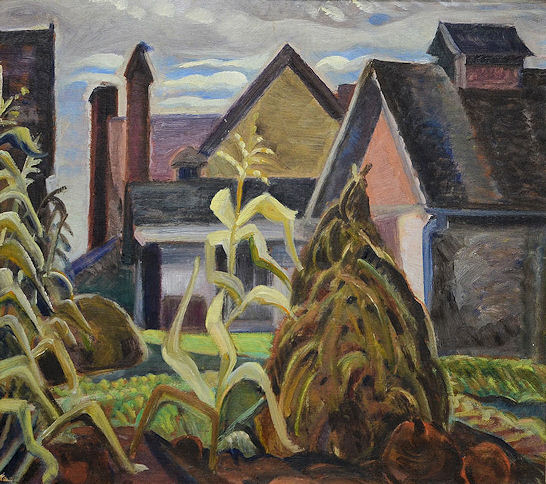Sugar shack, ca. 1939
Oil on plywood panel, 16 x 18 in.
Biography
Anne Savage July 27, 1896 – March 25, 1971 was a Canadian painter and art teacher. When she was born her name was Annie Douglas Savage in Montreal, Quebec, Canada, she grew up in what was then the rural area of Dorval, Quebec. She spent her summers at the family cottage in the Laurentian mountains where she developed a love of her surroundings that became a source of inspiration as an artist.
Between 1914 and 1915, Savage studied art at the Art Association of Montreal under several instructors including William Brymner (1855-1925). Her private world was permanently changed when her beloved twin brother was killed in action in France during World War I. After the end of the War, Anne Savage went to Minneapolis, Minnesota where she studied design at the Minneapolis School of Art. On her return to Montreal, she took a job as an art teacher at Baron Byng High School where she would remain for another 26 years. In addition, she taught art courses to children, promoting their early exposure to the field and years later was able to see the formation of the Child Art Council in Quebec.
In 1921, she joined the Beaver Hall Hill Group, painters closely allied to the Group of Seven whose member A. Y. Jackson, would become Savage’s lifelong close friend. After spending some time at the Ontario College of Art in Toronto with the painter Arthur Lismer, another member of the Group of Seven, Savage traveled to Europe where some of her works were exhibited. In 1933 she was one of the founding members of the Canadian Group of Painters and in 1949 and 1960 would serve as its president. She spent time in British Columbia and did sketches of native villages on the northwest coast.
After retiring from teaching High School, she was named the Supervisor of Art for the Protestant School Board of Greater Montreal. Invited by McGill University to teach, she was an instructor there between 1954 and 1959.
Anne Savage died in Montreal in 1971 and was interred there in the Mount Royal Cemetery. Throughout her life, Anne Savage spoke out about gender inequity. The Anne Savage Archives can be found at Montreal’s Concordia University.
Bio courtesy of: http://en.wikipedia.org/wiki/Anne_Savage_(artist)

